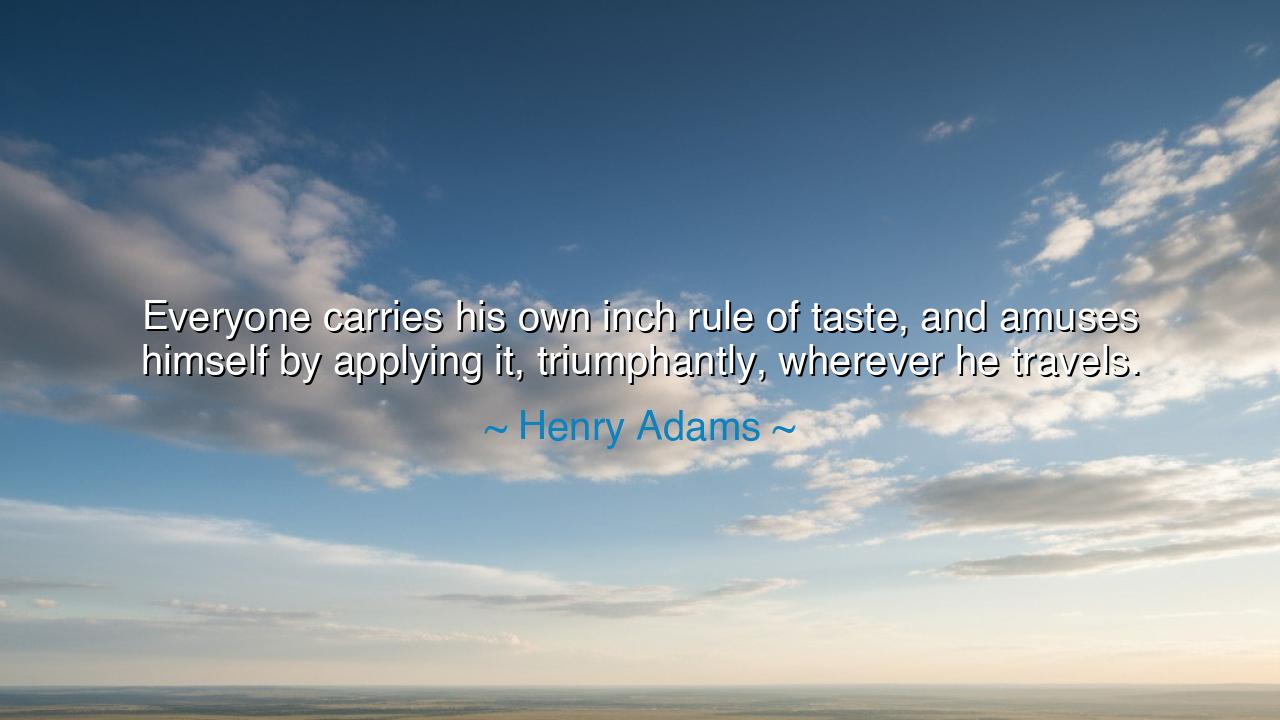
Everyone carries his own inch rule of taste, and amuses himself
Everyone carries his own inch rule of taste, and amuses himself by applying it, triumphantly, wherever he travels.






Hear, O listener, the words of Henry Adams, who once observed: “Everyone carries his own inch rule of taste, and amuses himself by applying it, triumphantly, wherever he travels.” Though his voice belongs to the world of scholars and statesmen, his meaning is ancient, for he speaks of the arrogance of judgment, the small measure by which men presume to weigh the vastness of the world. Each man, Adams declares, brings his own narrow standard, and wherever he journeys, he sets it against all things, declaring himself the master of what is beautiful, good, or true.
The inch rule of taste is the symbol of this folly. It is but a tiny ruler, carried by each man in his pocket, with which he dares to measure the cathedrals of Europe, the temples of Asia, the pyramids of Egypt, or the customs of foreign lands. With it he pronounces some things noble, others base, some refined, others barbaric—all according to the scale of his own small upbringing. In this, there is both humor and tragedy: humor in the image of a man with his little stick, boasting as he measures empires; tragedy in the blindness that prevents him from truly seeing what lies before him.
The ancients too recognized this arrogance. The Greeks, who named all foreigners “barbarians,” judged other peoples not by their virtues but by the absence of Greek speech. The Romans, who conquered the known world, marveled at Egyptian obelisks and Greek statues, yet often dismissed the cultures that had created them, holding up their own standards as supreme. Yet history proved that their inch rule was incomplete, for wisdom and beauty lay in every land, awaiting the eyes of those humble enough to see.
Consider also the story of Matteo Ricci, the Jesuit who traveled to China in the sixteenth century. Many Westerners before him had scorned Chinese customs, holding them against the measure of Europe. But Ricci chose humility. He learned their language, donned their robes, studied their philosophy, and in doing so, he gained access to the hearts of scholars and emperors. Where others wielded their inch rule with pride, Ricci cast his aside and instead carried the greater measure of respect. In this, he accomplished what armies and merchants could not—he built bridges between worlds.
Adams’ words, though written with irony, are a warning: beware the triumph of small-minded judgment. To travel with only your own measure is to miss the vastness of creation. The cathedral may be higher than your rule can reach, the symphony deeper than your ear has heard, the custom wiser than your own habits can comprehend. Yet the man who insists on his inch rule returns home thinking himself victorious, while in truth he has learned nothing, seen nothing, gained nothing.
O listener, the teaching is this: cast away your inch rule of taste. Travel with open eyes and open heart. Do not measure first, but behold. Do not condemn swiftly, but listen. Ask not how the world conforms to your small standard, but how you may grow to understand its greater harmony. For the true traveler is not he who carries his homeland like a ruler, but he who lets the world itself teach him new measures of beauty and truth.
Practical wisdom follows: when you enter a new land, a new culture, or even a new household, resist the temptation to compare it against what you already know. Instead, ask: What does this reveal? What does this mean to those who live here? What can I learn from it? In this way, you will transform travel from a game of judgment into a journey of wisdom.
Thus I say to you: Henry Adams’ words are both a jest and a warning. Every man carries his inch rule, but the wise man learns to set it down. For the world is too vast, too rich, too mysterious to be measured by a stick so small. Only humility, reverence, and curiosity can measure the true breadth of creation.






AAdministratorAdministrator
Welcome, honored guests. Please leave a comment, we will respond soon